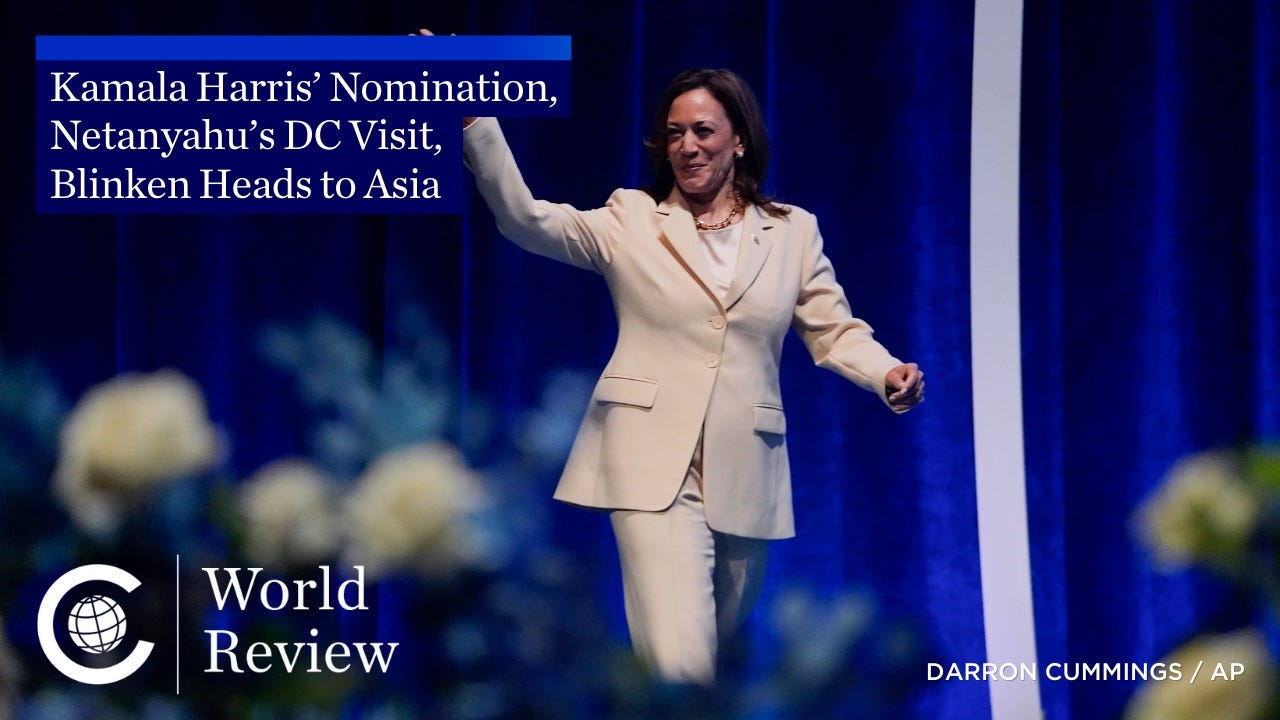World Review: Kamala Harris’s Nomination, Netanyahu’s DC Visit, Blinken Heads to Asia
A brief synopsis of this week's show
Each Friday morning, I host a video podcast called “World Review with Ivo Daalder” where three journalists from major news outlets around the world join me in discussing the latest global news stories of the week.
This morning, July 26, I was joined by Susan Glasser of The New Yorker, Ken Moriyasu of Nikkei Asia, and Prashant Rao of Semafor
“World Review is always fascinating. I love the fact that you can get journalists from around the world to participate since zoom is the medium.”
— A Subscriber to America Abroad
While I encourage you to watch or listen to the episode (and subscribe wherever you get your podcasts!), here are a few interesting things I took away from our discussion:
We started with another bombshell in American politics—President Biden’s announcement that he would not run for a second term and the elevation of Kamala Harris as the Democratic standard-bearer in the November elections. We may look back in a few years to this last month, since Biden’s disastrous debate performance and Harris’s emergence as the party’s nominee, as the month that changed the world, Susan noted. Before Biden’s decision, Donald Trump was cruising towards victory. Since then, the Democratic enthusiasm (backed by over a quarter billion dollars in new funding from big and small donors alike) has made the race competitive. When it comes to foreign policy, Harris represents a generational change. Unlike Biden, born during World War II and coming of age during the Cold War, Harris’s experiences are more 21st than 20th century. And while she will come to the presidency better prepared than any other president in 50 years aside from George H.W. Bush and Joe Biden, she will not have the certainty of views that led Biden to withdraw from Afghanistan, hesitate about providing Ukraine with the means to defeat Russia, or stand with Israel without hesitation.
Meanwhile, a deeply unpopular Benyamin Netanyahu, Israel’s Prime Minister, came to Washington to deliver a boisterous speech akin more to a State of the Union address than a remarks by a foreign leader. That was hardly surprising, Prashant argued. This was Netanyahu’s fourth speech to a joint meeting of Congress—more even than Winston Churchill—and the long-standing Israeli leader is no stranger to American politics. But if the goal here was to divide the Democrats and unite the Republicans, then the political earthquake in Washington this past week undermined that objective. Instead, Republicans cheered while many Democrats jeered—or stayed away altogether. Netanyahu’s goal seemed more political—hoping to avoid having to make a tough decision on a ceasefire by waiting out the American election—than an effort to gain American support.
Finally, as Antony Blinken heads for a multi-country visit to Asia, the discussions and actions in Washington underscored that for all the strategic attention and desire to increase the priority of the Indo-Pacific in US foreign policy, the crises in the Middle East and Ukraine and domestic politics still leaves the region too often as an afterthought. Blinken was supposed to attend the funeral of Nguyen Fhu Trong, Vietnam’s longstanding leader, but Ken noted he delayed the trip and missed the funeral so he could attend Biden’s meeting with Netanyahu instead. The slight was not lost in Asia, where Beijing gleefully sent a high ranking official to attend the funeral and the United States was represented by its ambassador. Whether the rest of his trip to Vietnam, Laos, Japan, the Philippines, Singapore, and Mongolia will garner more attention remains to be seen.
That’s it for my quick takes of this week’s episode here on America Abroad. To get the full flavor, please listen to the episode itself.






Amen on Bibi.